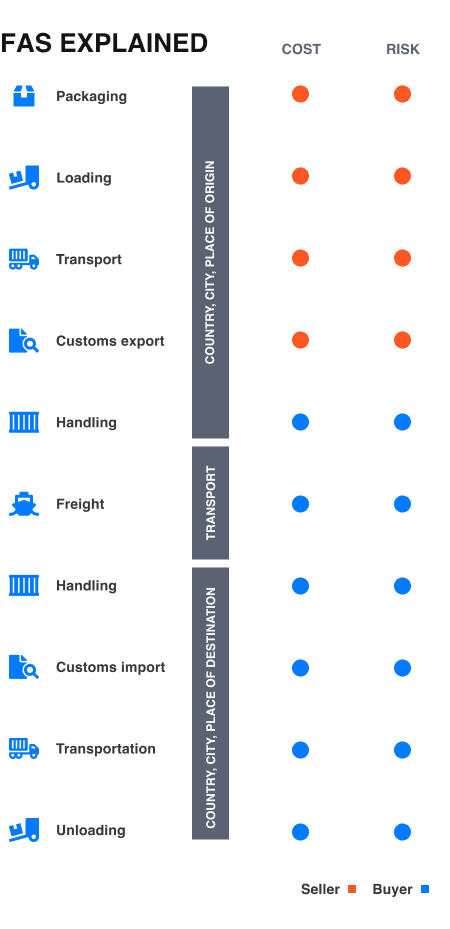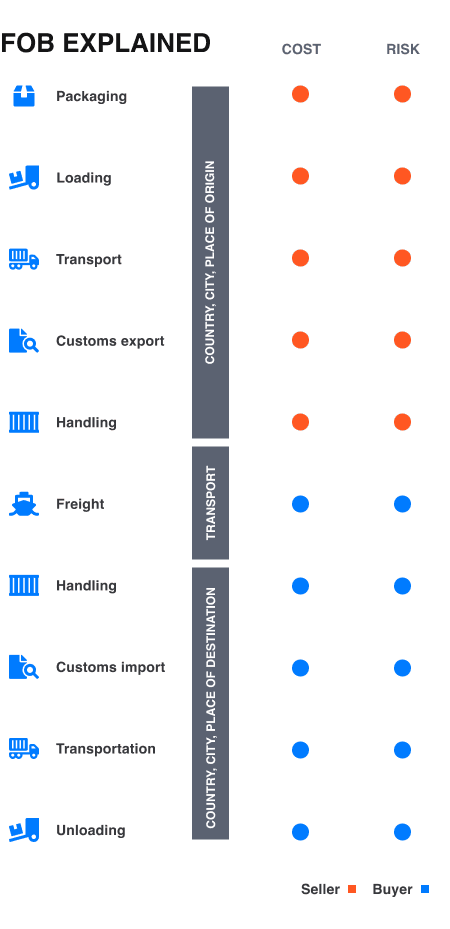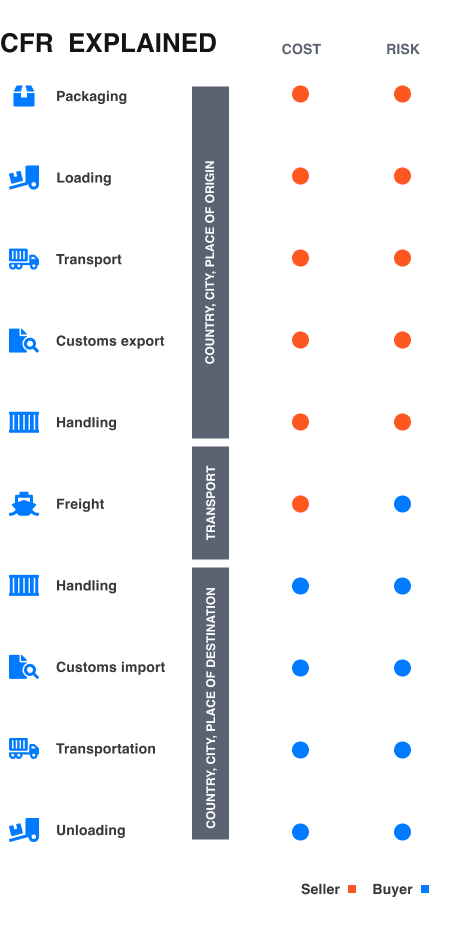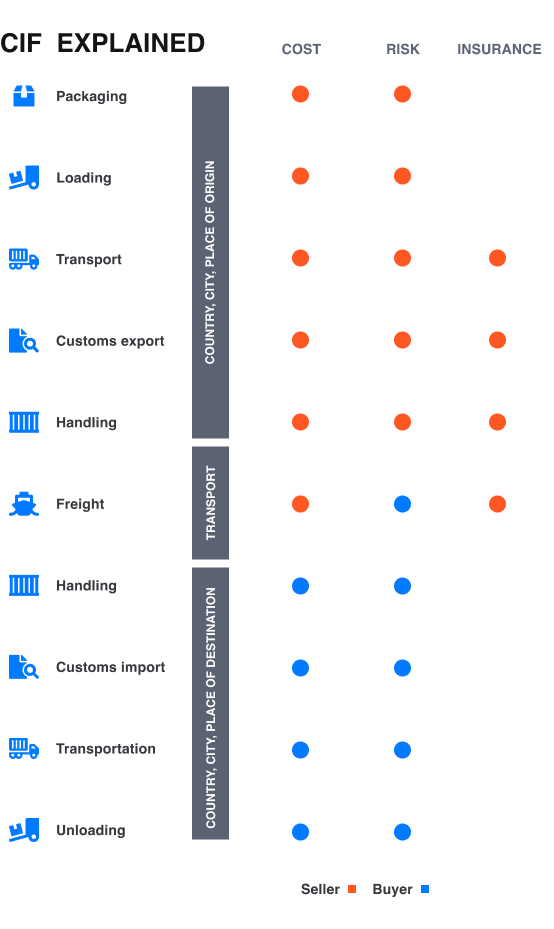Incoterms for sea freight: which incoterm should you choose in 2026
When drafting an international trade contract, it is essential to know which ocean and sea freight Incoterms are the most beneficial for you and your trade partners. The sea freight Incoterms were updated in 2020 by the ICC. Although there are 11 different Incoterms in total, 4 of them apply only for sea shipments. Learn more about the Incoterms for sea freight, the changes made to the sea freight Incoterms in 2020 and get ready to ship your goods internationally more effectively.
Find the best solution for your cargo shipping needs
Which incoterms are only for sea shipments?
Out of the 11 Incoterms, there are 4 that are exclusive for sea and ocean freight: FAS, FOB, CIF and CFR. These Incoterms can only be used for sea shipments, and they describe the conditions in which the cargo is loaded and unloaded on a vessel, who is responsible for insurance and customs clearance and the conditions of maritime transport.
Sea freight is one of the most popular methods of transport for international trade, so both sellers and buyers should be familiar with the Incoterms for sea and ocean Freight.
SEA FREIGHT INCOTERMS
Incoterms for sea freight: essential information
We have prepared an overview of the most common Incoterms for sea freight. Please check our extended pages to get a deeper insight and learn how to choose the best sea freight Incoterm for you.


FAS or Free Alongside Ship on ocean freight
FAS is one of the most popular among the 4 Incoterms for sea shipments. Free alongside ship means that the seller is obliged to clear the goods for export and leave them at the port of origin, while the buyer is responsible for loading, transporting and unloading the goods.![]() Read more about FAS
Read more about FAS


FOB or Free On Board on ocean freight
This is probably the most used Incoterm for sea freight. Under FOB, the seller is obliged to leave the goods free on board of the vessel at the port of origin, packed and cleared for transport. The buyer is responsible for transporting and for the insurance of the cargo from the moment it is loaded on the boat.![]() Read more about FOB
Read more about FOB


CFR or Cost and Freight on ocean freight
The CFR Incoterm for exporting or importing goods by sea mandates that the seller delivers the goods properly packaged and cleared for export and loads them on the selected vessel. The seller also pays for transport to the destination port.![]() All about CFR
All about CFR


CIF or Cost Insurance and Freight on ocean freight
The CIF incoterm establishes that the seller has to deliver the goods safely and properly packaged to the vessel at the export port, pay for the freight transport to the destination port and the customs clearance.![]() More about CIF
More about CIF
CONTAINER SHIPPING
Incoterms for container shipping by sea freight
Following the ICC recommendations, the Incoterms for sea shipments are meant for goods that are transported in bulk and should not be used for containerised cargo. This is because, in this case, the seller does not load the cargo onto the vessel but leaves the container at the designated point in the port of origin, making it difficult to establish ownership and liability when loading and unloading the cargo on the ship itself. Also, containerised cargo goes unchecked until it arrives at the destination, which makes it harder to determine when the damages occurred.
The ICC recommends using the multimodal Incoterms for container shipping by ocean freight to avoid miscommunication:
Sea freight Incoterms
Incoterms for container shipping
Even if it is not recommended, there are still many people that use Sea Freight Incoterms such as FOB and CIF for containerised cargo. Regardless of which Incoterms you decide to use, we advise buyers and sellers to agree on the Incoterms and establish responsibilities beforehand.
Ocean and sea freight cargo with Eurosender
Join the digital logistics world and access a vast network of vetted freight forwarders. At Eurosender, we collaborate with reliable cargo transport companies and international carriers and will connect you to the provider that best suits your needs. Our team of experts will act as an intermediary on your behalf to organise every detail of the shipping service.
Get in touch with an expert
Check our video to get an overview of our digital dashboard
NEED MORE INFORMATION?
Sea and ocean freight incoterms: frequently asked questions
Can I use the ocean freight Incoterms for multimodal trade routes?
Yes, sea and ocean freight Incoterms can be used for multimodal trade when the cargo is transported by sea, ocean or through inland waterways. These sea shipment Incoterms will regulate the cargo transport up to the port of destination.
Can I use sea freight incoterms for air cargo?
Incoterms for sea shipments can be used for sea, ocean and inland waterways (rivers, lakes) exclusively. However, the sea freight Incoterms were changed in 2020 and are updated and adapted regularly, which means they can be interpreted slightly differently in some countries. For example, some traders in the US may use FOB for air cargo. In this particular case, the plane would be the vessel. Both parties are advised to agree on the terms beforehand to avoid miscommunication.
What are the best Incoterms for exporting or importing goods by sea?
All Incoterms for shipping by sea have their advantages and disadvantages for international traders. Buyers are advised to discuss the possible options before choosing the best sea freight Incoterm for them.
What sea freight incoterm is better for the buyer?
It depends on the volume, type of cargo and flexibility you want. When importing goods, buyers often choose FOB.
Which Incoterms for sea and ocean freight is the best for the seller?
Sellers often choose the sea freight Incoterm based on the route. For example, CIF is a good option for sellers, as it does not involve a lot of risks and allows them to control the shipping costs until the destination port. This would allow you, as a seller, to choose the most cost-effective and efficient route for you. However, FOB is often the preferred sea freight Incoterm for a seller that does not want to organise the freight transport themselves and is not particularly interested in tracking the cargo. Although this allows the seller to release the responsibility of the cargo to the buyer from the destination port, it also means that the seller will have to bring their cargo to a loading port chosen by the buyer.